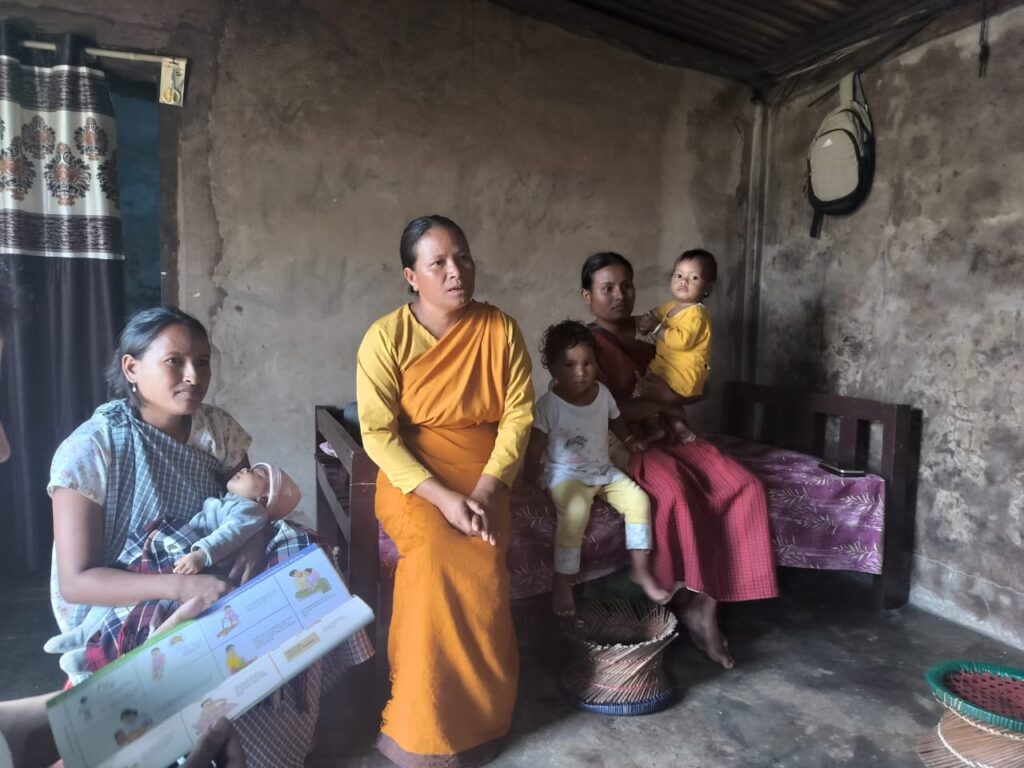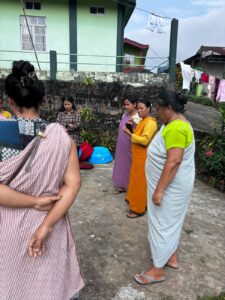Field Reflections from Saipung Block, East Jaintia Hills | October 30, 2025
Sometimes, change doesn’t arrive through big campaigns or loud slogans, it begins quietly, in small villages like Tluh, where everyday people are finding their own ways to make life better.
When we arrived at the local Anganwadi Centre (AWC), the first thing we noticed was the silence. There were no children playing that morning. The Anganwadi Worker explained that on days when attendance is low, she goes for home visits instead. The centre itself needed care — a leaking kitchen roof, bare walls, and a toilet door that hadn’t opened in years. But in the middle of this conversation came a small idea that shone brightly.

The worker smiled and said, “Children love to wear uniforms. When they see older kids going to school in uniforms, they want the same.” She explained how a simple thing like an Anganwadi uniform could make the children feel proud, excited, and eager to attend. It wasn’t about formality—it was about belonging. That small insight showed how deeply she understood the children she served, and how creative local solutions often come from those closest to the ground.
Later, we met a young mother with a three-month-old baby. She had thoughtfully spaced her pregnancies—her first child was already five years old. When asked why, she spoke calmly about advice from the health centre and the practical challenges of raising two small children at once. Her story wasn’t unique; another mother nearby shared a similar gap between her first and second child. Clearly, something was working in Tluh.
The source of that quiet success was easy to find—Dr. Toi, the Medical Officer at Sutnga CHC. She has become a local champion for birth spacing and women’s health. Her approach is simple, warm, and full of humor. She laughs as she recalls telling a young mother, “You’re 20 and already have two children! At this rate, you’ll have a football team by 30!”Her mix of care, firmness, and humour has built deep trust among families. Mothers often wave at her on the road, calling out, “I know, I know, Doctor, not yet!”

Trust has made all the difference. Women listen to her advice because they know she genuinely cares. She encourages the use of safe birth-spacing methods, especially injections, which many mothers prefer. Beyond this, her compassion goes even further—she often buys baby clothes and blankets for poor families herself. For her, health care is not just a service; it’s a relationship.
Dr. Toi also spoke about how ASHAs and ANMs in the area act quickly when they see warning signs in newborns. They accompany families to the health centre, sometimes even paying for transport themselves. It’s a quiet network of care, running on trust, empathy, and teamwork.
Even with challenges—poor roads, long distances, and limited facilities—Tluh’s story is one of quiet determination. Health workers, mothers, and doctors are finding their own ways to make sure every birth is safer, every mother is supported, and every child gets a fair start.
In a world where development often feels like something that comes from outside, Tluh reminds us that some of the best ideas grow from within. A thoughtful doctor, an observant Anganwadi Worker, and a few strong mothers—all showing that positive change begins when people care, listen, and lead from the heart.